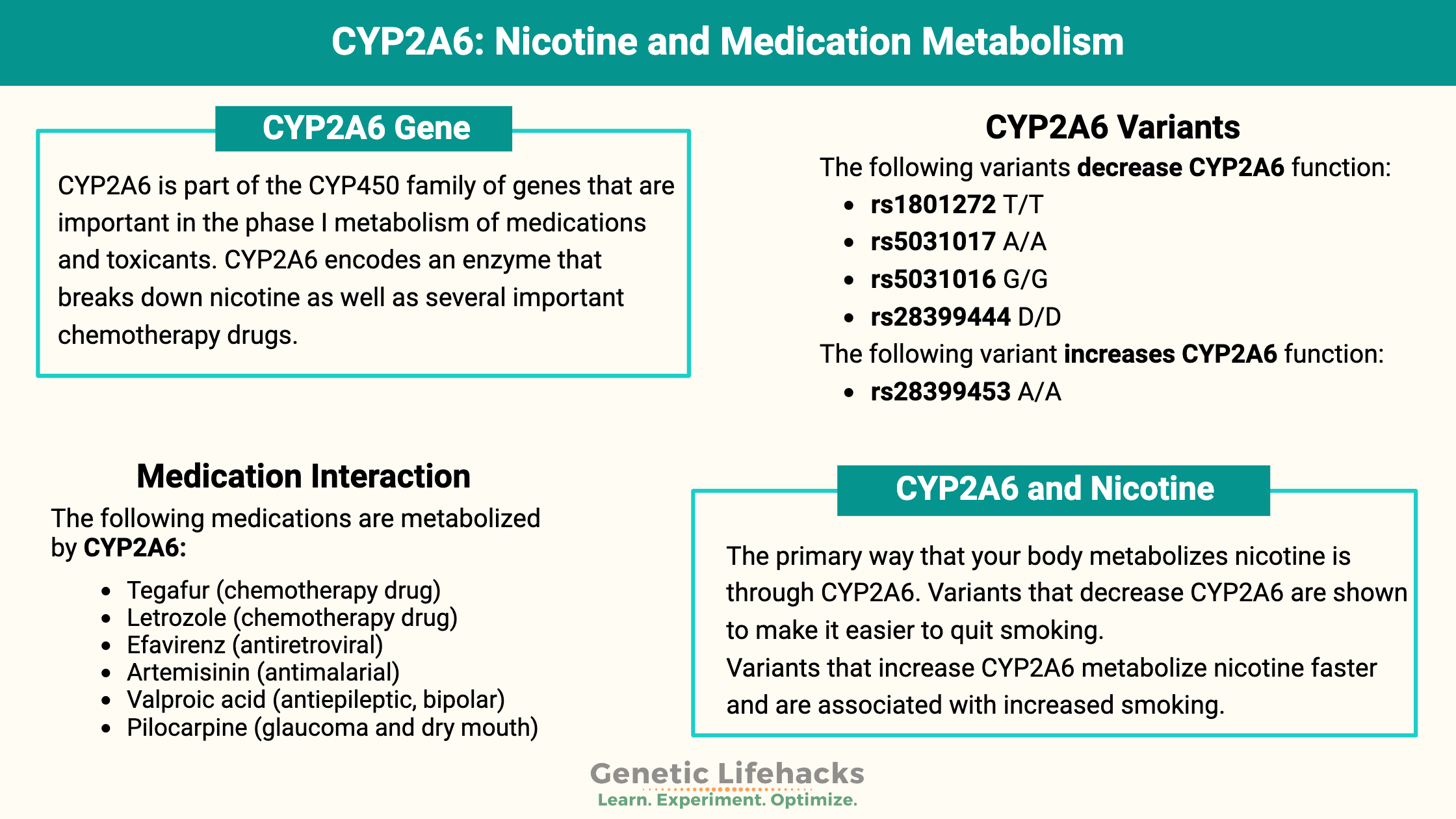Key takeaways:
~ CYP2A6 is an enzyme that breaks down nicotine as well as several important chemotherapy drugs.
~ Genetic variants in CYP2A6 can impact how well the enzyme functions, how certain chemo drugs work, and how hard it is to quit smoking.
Members will see their genotype report below, plus additional solutions in the Lifehacks section. Join today.
What is CYP2A6?
CYP2A6 is part of the CYP450 family of genes that are important in the phase I metabolism of medications and toxicants. Learn more about other detoxification genes here.
CYP2A6 is involved in the breakdown (metabolism) of:
- Nicotine
- Tegafur (chemotherapy drug)
- Letrozole (chemotherapy drug)
- Efavirenz (antiretroviral)
- Artemisinin (antimalarial)
- Valproic acid (antiepileptic, bipolar, migraine med)
- Pilocarpine (glaucoma and dry mouth)
Note that some drugs are metabolized through more than one CYP enzyme, so CYP2A6 may not be the only enzyme involved.
Endogenous substances metabolized by CYP2A6:
The CYP2A6 enzyme does more than just metabolize nicotine and certain medications. It also interacts with substances made naturally in the body.
CYP2A6 enzyme also breaks down:[ref]
- retinoic acid (from vitamin A)
- some steroid compounds
Estradiol, a form of estrogen, causes higher CYP2A6 activity. Thus, women usually have a somewhat higher overall activity of this enzyme.[ref]
Nicotine metabolism:
While other enzymes can also break down nicotine, the primary way that your body metabolizes it (breaks it down) is through hepatic CYP2A6 (70–80%). Also important to note is that the major metabolite of nicotine, called cotinine, is exclusively metabolized by the CYP2A6 enzyme.[ref] So, the CYP2A6 enzyme is responsible for two steps in the body’s process of getting rid of nicotine.
Quitting Smoking:
When it comes to smoking, the CYP2A6 genetic variants impact the speed at which nicotine is metabolized.
Researchers link genetic variants of CYP2A6 that cause decreased enzyme activity with a lower level of dependence in smokers, making it easier for them to quit. Basically, the slower CYP2A6 variants make the effects of nicotine last longer, thus reducing the number of cigarettes smoked.
On the other hand, people with increased CYP2A6 enzyme activity have an enhanced metabolism of nicotine and are likely to smoke more cigarettes per day.[ref]
CYP2A6: Genotype Report
Access this content:
An active subscription is required to access this content.
Lifehacks:
Grapefruit juice:
Grapefruit juice contains a substance that inhibits CYP2A6 enzyme activity. So be careful – especially if you have a slow variant of the gene – with combining grapefruit juice with any drug that is metabolized by CYP2A6.[ref]
Access this content:
An active subscription is required to access this content.
Related Articles and Topics:
CYP2C9: Breaking down prescription medications
Have you ever wondered why certain medications don’t work well for you? Genetic variants can change how fast or how slow the medication is broken down in your body. Learn how the CYP2C9 variants impact quite a few prescription medications.
Statins and Muscle Pain: Genes that impact myopathy
Statins are one of the most prescribed medications in the world. One side effect of statins is myopathy, or muscle pain and weakness. Your genetic variants are important in whether you are likely to have side effects from statins.
CYP1A1: Estrogen, hydrocarbons, air pollution
This phase I detoxification gene is important in the breakdown of the hydrocarbons produced in smoke and air pollution. It also affects the metabolism of estrogen.

